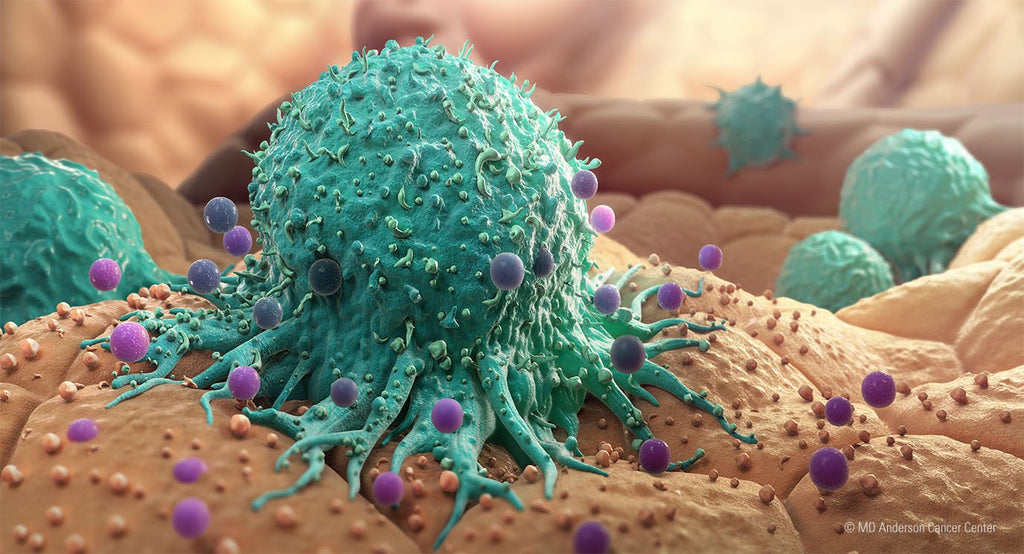Cancer remains a prevalent and complex disease, affecting millions of lives worldwide. To gain a comprehensive understanding of the risk factors and underlying causes associated with cancer, we delve into multiple reliable sources in this study. By shedding light on the subject, we aim to provide readers with a deeper understanding of this common disease. Drawing from reputable organizations such as the Cancer Research Institute, National Cancer Institute, Stanford Medicine, and others, we explore the multifaceted aspects of cancer development. With an estimated 18.1 million new cases annually worldwide, it's vital to comprehend the factors contributing to cancer. In this article, we highlight the risk factors, causes, and a potential ally in the fight against cancer: Arabic Gum.
When Does Cancer Happen?
Cancer emerges when cells begin to proliferate unchecked, infiltrating and damaging healthy bodily components. This process involves various stages, including precancerous alterations and malignant tumors. Different cancers progress at varying speeds, and not all cancers result in tumor formation. Cancer cells can also metastasize, spreading from their origin to other parts of the body through the lymphatic or circulatory systems. From organs like the lungs, kidneys, and skin to bones, blood vessels, and muscles, cancer can affect numerous areas of the body. Moreover, cancer can impact the immune system, further influencing its formation and progression.
Identifying Risk Factors
Research suggests that several risk factors contribute to the likelihood of developing cancer. Age is a significant factor, as cancer risk tends to increase with advancing years. Statistics from the National Cancer Institute's Surveillance, Epidemiology, and End Results program reveal that the median age of cancer diagnosis is 66. This means that 50% of cancer cases occur in individuals younger than 66, while the remaining 50% occur in those older than 66. This age trend holds true for various cancer types, such as breast, colorectal, lung, and prostate cancer. Genetic predisposition, exposure to carcinogens, lifestyle choices, and specific medical conditions also play a role in cancer development.
Carcinogens and Environmental Factors
Carcinogens are substances or agents that can cause cancer. Exposure to certain chemicals, pollutants, and hazardous substances significantly impacts cancer risk. Carcinogens can take various forms, including tobacco smoke, asbestos, chemicals used in manufacturing, and even naturally occurring substances. Additionally, both ionizing and non-ionizing radiation have been linked to increased cancer risk. Specific industries with occupational exposures to certain chemicals and substances further heighten the likelihood of cancer development.
Lifestyle Choices and Cancer Risk
Our daily choices can profoundly impact our risk of developing cancer. Unhealthy habits, such as tobacco and alcohol use, have long been associated with an increased risk. Tobacco smoke contains numerous carcinogens, leading to a higher probability of developing lung, throat, and other types of cancer. Excessive alcohol consumption is linked to elevated risks of cancers in the mouth, throat, liver, breast, and other organs. Poor diet lacking in fruits, vegetables, and whole grains, coupled with a sedentary lifestyle, contributes to obesity, which is a risk factor for various cancers. Studies have shown that around 4-8% of all cancers can be attributed to obesity.
Medical Conditions and Cancer
Certain medical conditions and treatments can increase the risk of developing cancer. Chronic infections caused by viruses, bacteria, or parasites have been associated with elevated cancer risk. For example, chronic infection with hepatitis B or C viruses can lead to liver cancer, while human papillomavirus (HPV) increases the risk of cervical, anal, and other cancers. Furthermore, specific treatments like radiation therapy, certain chemotherapy drugs, and hormone replacement therapy have been linked to an increased cancer risk.
Prebiotics & Other Cancer Prevention Strategies
In recent years, emerging research has suggested that prebiotics, including Arabic Gum, may play a role in combating cancer and reducing the risk of its development. Prebiotics are non-digestible fibers that nourish and support the growth of beneficial bacteria in the gut. By promoting a healthy gut microbiome, prebiotics strengthen the immune system and maintain optimal digestive function. Studies have shown that a balanced gut microbiota can contribute to a reduced risk of certain types of cancer. Arabic Gum, in particular, has been identified as a valuable prebiotic with potential cancer-fighting properties. It promotes the growth of beneficial bacteria while inhibiting the growth of harmful bacteria, potentially reducing the risk of colorectal cancer. Incorporating prebiotic-rich foods or supplements, including Arabic Gum, into a balanced diet may offer additional support in reducing cancer risk. However, it is crucial to consult healthcare professionals before making significant dietary changes.
Conclusion
Understanding the causes and risk factors associated with cancer is essential for prevention, early detection, and effective management. Age, genetic factors, environmental exposures, lifestyle choices, medical conditions, and the potential benefits of prebiotics all contribute to cancer development. By promoting healthy lifestyles, minimizing exposure to carcinogens, and considering the potential benefits of prebiotics like Arabic Gum in supporting a healthy gut microbiome, we can work collectively to reduce the burden of cancer. Staying informed about the latest research and consulting healthcare professionals are crucial steps towards making informed decisions about cancer prevention and overall well-being

